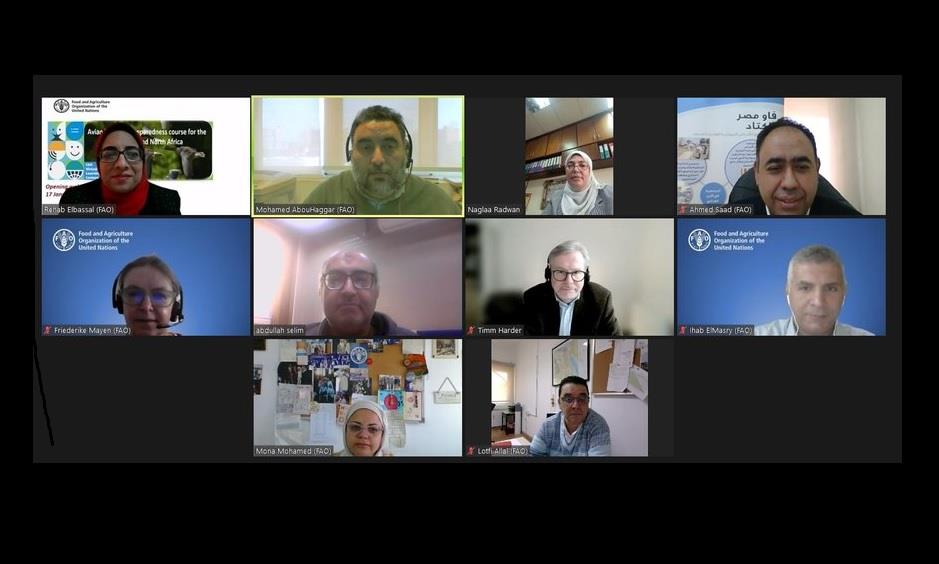FAO launches bilingual training course on Avian Influenza preparedness for NENA region

17 January 2023, Cairo -- Avian Influenza is one of the major transboundary animal diseases (TADs) which has wide-ranging impacts on the livelihoods of smallholder farmers and poultry farmers, as well as on regional and international trade, food safety, public health, and international travel and tourism.
The Food and Agriculture Organization of the United Nations (FAO) Virtual Learning Center for the Near East and North Africa (VLC-RNE), in collaboration with the FAO Emergency Center for Transboundary Animal Diseases (ECTAD) in Egypt, delivers an online training course on Avian Influenza preparedness for the Near East and North Africa. Participants are governmental staff.
The content of this course was developed by FAO together with the Friedrich Loeffler Institute (FLI), Germany, and includes feedback from the pilot course. The course combines convenient self-paced study with a unique opportunity to discuss and network with international and national experts. The overall objective of the course is to strengthen the capacity of the countries for early warning, risk reduction and management of Avian Influenza outbreaks by building knowledge and skills for detection, prevention and response to AI outbreaks amongst technical specialists and field veterinarians.
Course outline:
The course is conducted entirely online through the Virtual Learning Centers (VLC) platform. It will take approximately 14 hours to complete and will run for 4 weeks. Up to300 participants from 19 member countries in NENA region will attend the course simultaneously. The course started on 17 January 2023 with an interactive webinar where participants met with their trainers and learned about the overall course content, as well as about the AI situation in the region. The trainees will go on to learn through eight interactive online modules, covering the impact and importance of AI, epidemiology, pathogenesis, clinical and laboratory diagnosis, outbreak investigation, prevention, surveillance, control with and without vaccination, etc. This interactive course is enriched with audiovisual materials and self-test questions. During the course, expert trainers will be available to answer trainees’ questions via a discussion forum, and will also lead interactive discussions.
A specific topic of focus is covered during each week of the four-week program using a discussion forum. Trainers post questions to challenge participants and deepen their understanding of the course materials. The course ends with a final assessment and a closing webinar covering topics that participants found difficult or that sparked the most discussion in the forum. Participants who complete the coursework with a satisfactory comprehensive assessment are awarded a certificate.
About the FAO VLCs
FAO Virtual Learning Centers (VLCs) are virtual hubs established to develop and improve One Health capacities in all FAO regions. Our mission is to provide our trainees with access to inclusive, engaging and high-quality training using a variety of methodologies.
The VLCs follow a decentralized model that empowers FAO regions to develop and deliver courses that closely consider regional needs and context. This model also makes it possible to scale up the delivery of courses and share resources and good practice between VLCs.
There are currently six VLCs, with at least one VLC established per FAO region, delivering courses to trainees around the world. The courses are developed in close collaboration with FAO technical divisions, regional focal points and international experts.
The VLC trainings contribute to improving the productivity and sustainability of agriculture and food production systems by building the skills of a range of actors along the value chain (SDGs 1 and 2: ‘no poverty’ and ‘zero hunger’). In addition, VLC strategic deployment across regions, with trainees able to study courses free of charge and at a time and place suitable to them, ensures access to all (SDG 10: ‘reduced inequalities’). Furthermore, the VLCs consider the impacts of gender on access to online training resources, with the aim of understanding and bridging any gaps that exist (SDG 5: ‘achieve gender equality’).
About ECTAD:
The Emergency Centre for Transboundary Animal Diseases (ECTAD), has built strong and enduring ties with the Ministry of Agriculture and Land Reform (MOALR). Since 2006, ECTAD has provided diverse institutional capacity strengthening support (skilled manpower, hard-/software, infrastructure, network, etc.) to strengthen the Livestock Early Warning System (investigation and response, epidemio-surveillance and laboratory diagnostic capacities) at both central and field levels.
“The course will pave the way to improving the personal skills of governmental staff, using new e-learning technology that will contribute to Avian Influenza preparedness and control efforts. The course addresses specific issues for a wide range of participants by offering tailored training solutions which will substantially increase the reach and depth of our continued training program.” – Dr Lotfi Allal, ECTAD team leader.
Related links
